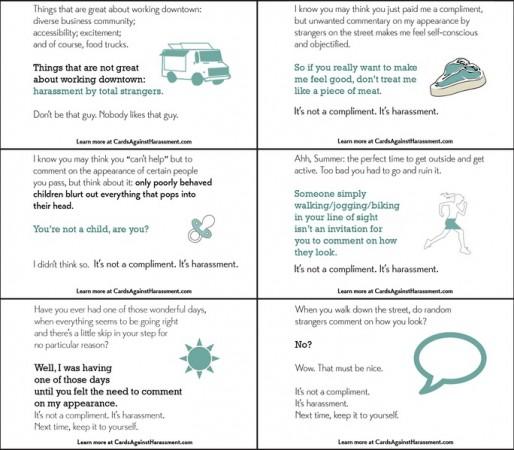"A lot of the times you don't say it. At least I don't. You keep walking. You keep moving because you don't have time. You don't have the energy, or you don't want it to escalate. You never really know what will happen. It could easily get dangerous," says artist Tatyana Fazlalizadeh.
It is true that most women ignore these incidents and walk away because sometimes if they protest, it proves to be dangerous for them. Most women have experienced harassment on the streets at some point in their lives and a few have protested as well but in different styles. According to WNYC, Fazlalizadeh protested against these catcallers by making posters and displaying them across Brooklyn.
Likewise, Minneapolis resident Lindsey adopted a unique way to raise her voice against her catcallers. Buzzfeed reported an incident when she was harassed by a stranger on an escalator, and when she responded, the guy screamed calling her ugly.
This incident made Lindsey come up with the idea of 'Cards Against Harassment', which would counter attack the street harassment in Minneapolis. The pocket-sized cards are designed for the women who have faced harassment and were unable to respond. The cards will allow women to give street harassers the feedback of their behavior.

Apart from this, Lindsey started filming the encounters she experiences. She captures the incidents, which include conversations, and uploads them so that if the man watches it, he would be embarrassed the same way.
"The irony is not lost on me, that a man who gave me unwanted attention is now upset he may get unwanted attention," said Lindsey, when one of her harassers contacted her after watching the video.
She says these incidents reminded her of last year's Craigslist ad gone viral, where a girl was harassed by a guy on the street but she could not confront him.
Whether it's catcalls or wolf whistles, women have always faced such unwanted attention. Sexual harassment is prevalent all over the world.
According to Centre for Equity and Inclusion's 2009 survey, 95 percent of women in India said the mobility in the city is restricted in public places due to fear of male harassment, reports Stop Street Harassment. The survey has also reported the statistics from most of the developed countries where women feel less safe than men.








